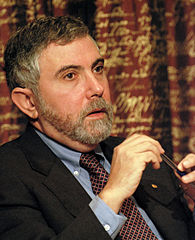In 2006 Paul Krugman, prominent liberal economist and New York Times columnist, expressed concern that low-skilled immigration could threaten the American welfare state. Due to this supposed threat and the claim that the wages of some Americans were lowered because of immigration, he supported a reduction in the number of low-skilled immigrants entering the U.S. (See here for this site’s page on Mr. Krugman.)
So it wasn’t surprising when Mr. Krugman recently declared that he didn’t support open borders. What was surprising was that he justified immigration restrictions that were enacted in the early 1920s. He stated that without those restrictions the New Deal in the United States “wouldn’t have been possible,” in part because “…there would have been many claims, justified or not, about people flocking to America to take advantage of welfare programs.” The New Deal of the 1930s, as many readers may know, involved the establishment under Franklin D. Roosevelt of government programs which continue to exist today, such as monetary support for the elderly (Social Security) and aid to poor mothers and their children.
The immigration legislation to which Mr. Krugman referred included the Immigration Act of 1921, which established the first numerical restrictions on European immigration. It was followed by the longer lasting Immigration Act of 1924, which also involved numerical restrictions and a national origins quota system in which visas were apportioned predominately to immigrants coming from northwest Europe. Maldwyn Jones, author of American Immigration, notes that:
it was American policy which brought to an end the century-long mass movement from Europe. The adoption of the quota system… all but slammed the door on the southern and eastern Europeans who had formed the bulk of the arrivals in the prewar (World War I) and immediate postwar periods. The result was that European immigration slumped from over 800,000 in 1921 to less than 150,000 by the end of the decade. (page 279)
The legislation was in many respects the model for our current immigration system, with its numerical limitations on immigration from individual countries, numerical limitations for certain categories of immigrants, use of preference groups within these categories, consular control over permission to immigrate, and the creation of the Border Patrol. From an open borders perspective, it was a disaster, ending a long period of generally open immigration from Europe.
Whether or not Mr. Krugman is correct or not that the 1920s immigration restrictions helped to provide a political environment conducive to passing the New Deal legislation, there are two reasons why his support for the restrictions are surprising. One is that the legislation was largely racist. The Immigration Act of 1924 was inspired by racist sentiment and, as noted, discriminated against the immigration of people from eastern and southern Europe, who were perceived by some to be racially inferior. As John Higham has written in Strangers in the Land, as the House of Representatives worked towards the 1924 legislation, the champions of the legislation:
now largely ignored the economic arguments they had advanced in behalf of the first quota law three years before. Instead, they talked about preserving a ‘distinct American type,’ about keeping American for Americans, or about saving the Nordic race from being swamped. The Ku Klux Klan, which was organizing a vigorous letter-writing campaign in support of the Johnson bill, probably aided and abetted this swell of racial nativism… (page 321)
The second reason why it is surprising Mr. Krugman would be supportive of the 1924 immigration law is that because it, combined with other restrictionist maneuvering, blocked many of Europe’s Jews from fleeing the Nazis during the 1930s and 1940s. David Wyman has written in Paper Walls that,
if, in the crucial years from 1938 to 1941, the world had opened its doors to the victims of persecution, the history of Europe’s Jews from 1942 to 1945 would have been significantly different. Instead the barriers held firm and relatively few refugees found asylum. (page xiii)
Mr. Wyman also has noted that although America received more refugees (about 250,000) from Nazism than other countries during the period 1933 to 1945 (p. 209), “the total response of the United States… fell tragically short of the need.” (preface) According to Mr. Wyman, it was the 1924 law that was the fundamental barrier to the people seeking refuge in the U.S., noting that “the quota limitations formed by far the most significant bulwark against large-scale American rescue of refugees.” (p. 210)
It is difficult to determine the number of would-be refugees who were killed because of U.S. immigration restrictions. However, the following information from the United States Memorial Holocaust Museum site suggests the large numbers who were put at risk from the restrictions:
In late 1938, 125,000 applicants lined up outside US consulates hoping to obtain 27,000 visas under the existing immigration quota. By June 1939, the number of applicants had increased to over 300,000. Most visa applicants were unsuccessful.
The fate of 908 refugees aboard the ship named the St. Louis who were denied refuge in the U.S. in 1939 is more certain, with 254 perishing in the Holocaust. Mr. Wyman also notes that other refugee ships, either without a place to land or planning to land illegally in Palestine, sank, drowning hundreds. (pp. 38-39)
Mr. Krugman must surely be bothered by the racist nature of the 1924 legislation and must certainly wish that the U.S. had been more welcoming to refugees during the Nazi period. Furthermore he has noted that he is “grateful that the door was open when my grandparents fled Russia.” Had his grandparents tried to enter America after the 1924 restrictions were in place, they may not have been allowed in and may have perished at the hands of the Nazis.
How does Mr. Krugman square all this with his support for the 1924 immigration legislation? Was the suffering associated with the legislation an acceptable sacrifice in order to ensure that the New Deal legislation could be passed? Mr. Krugman might respond to this question by wishing that the U.S. had adopted a more generous refugee policy during the Nazi period within a system of immigration restriction, but the fact is that the U.S. didn’t.
Of course, even setting aside the history of the American immigration system’s response to the refugees fleeing the Nazis, the suffering associated with immigration restrictions are immense. Co-blogger Nathan Smith challenges Mr. Krugman’s suggestion that the American welfare state is of higher moral value than open borders. He writes that:
Krugman wants a social democratic welfare state even at the cost of excluding most of mankind by force. I start from a utilitarian universalist ethics and conclude that its need for immigration exclusion renders the welfare state a moral travesty.
Nathan argues that a truly moral anti-poverty policy would focus on alleviating the extreme poverty of the Third World rather than the poverty found in the U.S.: “Domestic redistribution is at best from the very-rich to the relatively-rich.” He writes that “the best thing America could do for the poor is to open the borders.”
I support both open borders and the welfare state. Fortunately, perhaps with the use of keyhole solutions, countries may be able to have both. Mr. Krugman should explore this possibility, as well as reconsider his support for the 1924 immigration legislation.
Featured image: Paul Krugman’s press conference following his receipt of the Nobel Prize in Economics, by Prolineserver from Wikimedia Commons.


